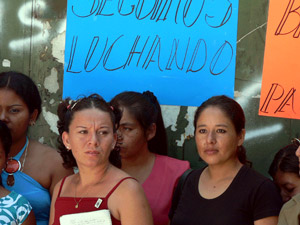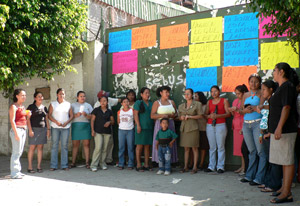WELCOME TO THE ARCHIVE (1994-2014) OF THE MAQUILA SOLIDARITY NETWORK. For current information on our ongoing work on the living wage, women's labour rights, freedom of association, corporate accountability and Bangladesh fire and safety, please visit our new website, launched in October, 2015: www.maquilasolidarity.org
June 20, 2007

Ex-Hermosa workers at the factory gates.
Credit: Christliche Initiative Romero
A new study prepared by the Maquila Solidarity Network (MSN) for the Fair Labor Association (FLA) documents the desperate situation of former employees of the Hermosa Manufacturing facility in El Salvador, which closed in May 2005, leaving former Hermosa workers without jobs, without back wages, without severance pay, without health insurance and without employee pensions.
Workers have lost their homes, their health, and many – in particular those who had organized a union at the factory – remain unemployed to this day. At least five of the women among the 63 organized ex-Hermosa workers have reportedly lost their formerly subsidized homes because their former employer didn’t remit their contributions to the Social Housing Fund despite deducting payments from their wages. Some are suffering serious illnesses, including cancer, and no longer have access to ISSS health care, despite promises by the Salvadoran government.
On December 22, 2006, the Fair Labor Association (FLA) announced the creation of an Emergency Fund “to provide immediate and direct assistance to the [former Hermosa] workers while efforts continue to hold the government of El Salvador and the factory owner responsible for carrying out their legal obligations to the workers.”
As a condition of setting up the Emergency Fund, the FLA also committed to reviewing the impacts of the Fund and considering further measures to remediate the situation of the ex-Hermosa workers. In January 2007, the FLA contracted the Maquila Solidarity Network to carry out a study as part of its review process.

Credit: Christliche Initiative Romero
Based on interviews with FLA participating companies, staff and NGO members, other companies that had sourced from the Hermosa factory in El Salvador, the organized ex-Hermosa workers, and the various international and Salvadoran stakeholders in this case, MSN’s study documents their different perceptions and concerns about what responsibilities buyers have in this case and in other situations in which a supplier fails to fulfill its legal obligations to workers, and the government fails to take appropriate steps to see that those obligations are met.
The study also attempts to identify further steps that could be taken to rectify the injustices suffered by the Hermosa workers, and explores possible options, policies and procedures that buyers, both individually and as a group through the FLA or another entity, could put in place to minimize the possibility of similar situations taking place in the future.
Some of MSN’s immediate recommendations include:
To read the report, download (in PDF format):
The Fair Labor Association responded to the MSN report, saying "Consistent with the MSN recommendations, FLA-affiliated companies and the FLA have taken and continue to take actions to promote reemployment of former Hermosa workers and continue to press the government of El Salvador to meet its obligations to workers… In addition to conducting training on nondiscriminatory hiring practices for factories that supply FLA companies, the FLA is conducting an assessment of the policies and practices of the factories and is considering engaging an ombudsperson to investigate allegations of discrimination against former Hermosa workers. The FLA is also prepared to seek additional voluntary contributions to the emergency fund and make an additional distribution of funds to former Hermosa workers should such contributions become available."
Following the release of MSN’s report, MSN met with ex-Hermosa workers to discuss the findings. While they agreed with most of the study’s recommendations, workers had criticisms.